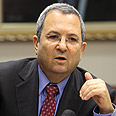
The trouble with Barak
Op-ed: Defense Minister Barak likes to pose as mediator but in fact starts all the fires
A year and a half ago, in a briefing to military correspondents, Defense Minister Ehud Barak announced that he intends to “take the reins” and be “closely involved” with the upcoming IDF round of appointments. He said that in his view, the various posts must be manned in a manner that would “allow several generals to realistically compete for the chief of staff post.”
Such announcement, years before the current army chief’s term ends, is tantamount to an open invitation for the generals to curry favor with the person who will decide about their promotion. In order to ensure that all the generals fully understand who the new boss is, Barak permitted the military correspondents to directly quote him, rather than “a senior security source.”
Indeed, from that moment onward, it appeared that top officers at the “villa in the jungle” – as Barak himself dubbed the State of Israel a few years ago – are behaving as though they are competing in a reality show Big Brother villa. At this time we are watching the grand finale, which is being characterized by especially lowly quarrels. After all, the State of Israel’s security problems – Iran, Lebanon, and Gaza – are minor theaters compared to the generals’ power struggled in “Survivor – the VIP version” (only open to major generals and brigadier generals.)
It appears as though creating and resolving crises is a regular pattern with Barak. For example, towards the end of the Olmert government’s term in office, when then-Foreign Minister Tzipi Livni asked that the Gaza blockade preventing goods from entering the Strip be lifted, Barak resisted while resorting to decisive security arguments. Even Gilad Shalit’s name was mentioned in order to justify a policy that allowed pasta to enter the Strip but banned macaroni with tuna.
The siege policy, inherited by the current government, has become a substantive burden for Prime Minister Netanyahu’s foreign policy and presented his government in a ridiculous light in the eyes of the international community. However, for the man found at the decision-making junction, foolish and unclear policy is a blessing. There are always exceptions that only the “responsible minister” can approve. We just need to clarify to the world who they should be turning to. When Quartet envoy Tony Blair wishes to elicit a “siege” concession and allow cement for the UN or cash for Gaza banks to come into Gaza, he turns directly to the “moderate minister” in the government.
Containment policy
US President Barack Obama also took notice of Barak’s abilities as a mediator. Even at moments of great anger towards Netanyahu (over decisions taken and approved by the Israeli government – where Ehud Barak is a senior member,) the American president always maintained an open channel of communication to Israel’s de facto foreign minister – Ehud Barak, who had been frequently summoned for pre-reconciliation meetings in the US.
Meanwhile, Israel’s deterrent power is currently being eroded on all possible directions. The offensive security doctrine adopted by Ben-Gurion had been replaced by Barak’s defensive doctrine. Even when the IDF has to attack, the new security doctrine ties its hands with impossible instructions such as taking over a ship while using paintball guns.
Last week, an operation to uproot a tree ended tragically, with a reservist battalion commander being killed. However, even that incident failed to prompt public criticism of the man who introduced the “containment policy” to the IDF after ordering it to withdraw from Lebanon in 2000.
Yet the latest nadirs were reached over the weekend, in the form of the pathetic steps taken by some general – regardless of whether one hired a PR expert or another forged a document. After all, the truth will be investigated and come to light. However, in this era of instant news, one needs long memory to understand that the seed sown by Barak via his announcement to military correspondents a year and a half ago is what gave rise to the rotten tomatoes currently being hurled in the nation’s collective face.
After all the years where Barak had been in every decision-making junction, hasn’t the time come to ask some questions: Is it possible that the fires don’t break out on their own? Perhaps, instead of choosing a new chief of staff, the government will finally appoint a worthy defense minister?
Avi Trengo is a journalist
- Follow Ynetnews on Facebook










